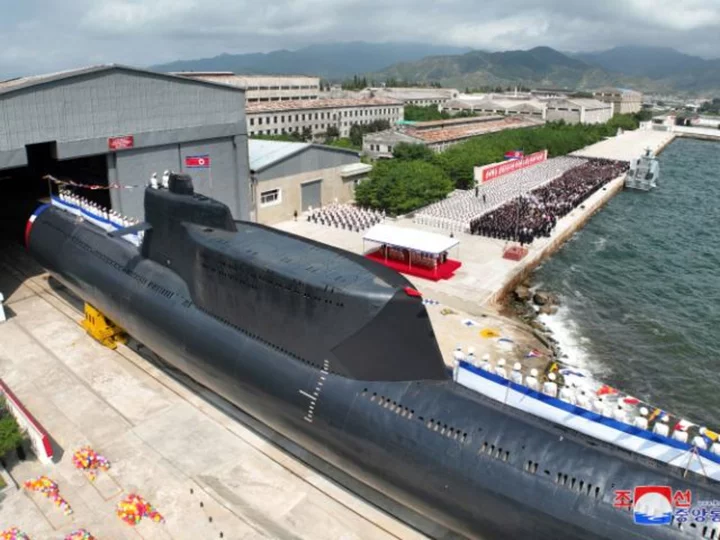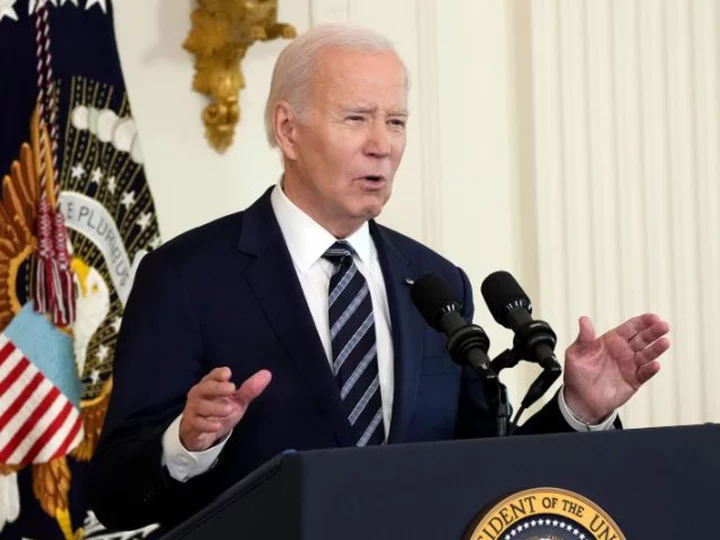North Korea claims to have launched a new "Korean-style" tactical nuclear attack submarine that it says heralds "the beginning of a new chapter" for its navy. But analysts say those claims should be taken with a large pinch of salt, with South Korean authorities doubting the vessel even works properly.
The submarine, named "Hero Kim Kun Ok," was launched to much fanfare at a ceremony attended by North Korean leader Kim Jong Un on Wednesday, according to the state-run Korean Central News Agency (KCNA).
The agency quoted Kim as saying the vessel was "equipped with a large number of nuclear delivery means" and capable of "preemptive and retaliatory strikes against hostile countries," and said he had called on the country to convert all of its medium-sized subs into nuclear-capable versions.
But South Korea's Joint Chiefs of Staffs (JCS) poured scorn on those claims in a statement on Friday, saying the new sub appears "not capable of normal operation," and warned there were signs North Korea was trying to exaggerate its capabilities.
The reports about the sub come after North Korea last weekend claimed to have simulated a nuclear missile attack to warn the United States of "nuclear war danger."
Meanwhile, US experts have also expressed doubts over the new submarine, both over the potency of its missiles and whether North Korea would be able to build more than one such vessel.
What's 'nuclear' about it?
US analysts believe the submarine, which was first revealed to be under construction four years ago, is conventionally powered but possibly capable of launching ballistic missiles tipped with nuclear warheads.
Submarine expert H I Sutton, writing on the Naval News website, said the new vessel appears to be based on the old Soviet-designed Romeo-class submarines. According to the Nuclear Threat Initiative, North Korea already has 20 Romeo-class subs in its fleet of an estimated 64 to 86 submarines.
The latest sub appears to have 10 missile launch tubes in a compartment attached to its sail, Sutton noted, adding that, "Given the Hermit Kingdom's investment in ballistic missiles, it is likely that these are nuclear capable."
North Korea has test-fired submarine-launched ballistic missiles (SLBMs) nine times since 2015, most recently in 2022, according to the James Martin Center for Nonproliferation Studies (CNS) North Korea Missile Test Database.
However, other analysts said it remained unclear whether the new sub was capable of launching SLBMs.
Others were even more skeptical. Carl Schuster, a retired US Navy captain and former director of operations at the US Pacific Command's Joint Intelligence Center, said the newly launched sub was probably two years away from being fully operational. He said installing and testing the sub's internal machinery and components would take around 18 months, then there would be up to six months of sea trials and training.
And even if and when the sub does become fully operational, there are some who doubt the effectiveness of Pyongyang's submarine-launched missiles.
Vann Van Diepen, a former US government official working on weapons of mass destruction issues, wrote on the 38 North website in July that ballistic missile subs had taken a back seat to land-mobile ballistic missiles in Pyongyang's forces and were unlikely to be "a consequential and credible leg" of its nuclear forces anytime soon.
"Pyongyang's land-based missiles, which are much more survivable and cost-effective than a (ballistic missile submarine) force, are highly likely to remain the mainstay of its nuclear and missile forces," he wrote.
Sending a message
While analysts believe the sub launched on Wednesday is conventionally powered, Kim has said previously that he wants his country to produce nuclear-powered vessels in the future.
He reiterated that call in his speech Wednesday, saying it was "necessary to give greater impetus to the construction of nuclear-powered submarines to strengthen and develop our navy into a military force of a world-class maritime power," according to KCNA.
Irrespective of its power source, Schuster said Wednesday's launch enabled Kim to "send a deterrent message" to adversaries like the US and Japan.
"He is signaling that his nuclear program is progressing and that he can soon conduct strikes from multiple directions," Schuster said.
All US Navy submarines, both of the attack and ballistic missile varieties, are nuclear powered. Russia, China, Britain, France and India also operate nuclear-powered subs.
The launch of the sub and North Korea's claim to have simulated a nuclear missile attack last weekend come as Pyongyang prepares to celebrate the 75th anniversary of the country's founding on September 9.
The events also come amid signs that Pyongyang has been rattled by increasing cooperation between the United States and South Korea.
At the end of August the two countries held joint military live-fire exercises simulating a counterattack against invading forces. And following a May summit meeting in Seoul the US and South Korean presidents pledged to step up military cooperation. That pledge followed more than a dozen missiles tests by North Korea this year -- a big increase on the eight it carried out in 2021 and the four in 2020.









